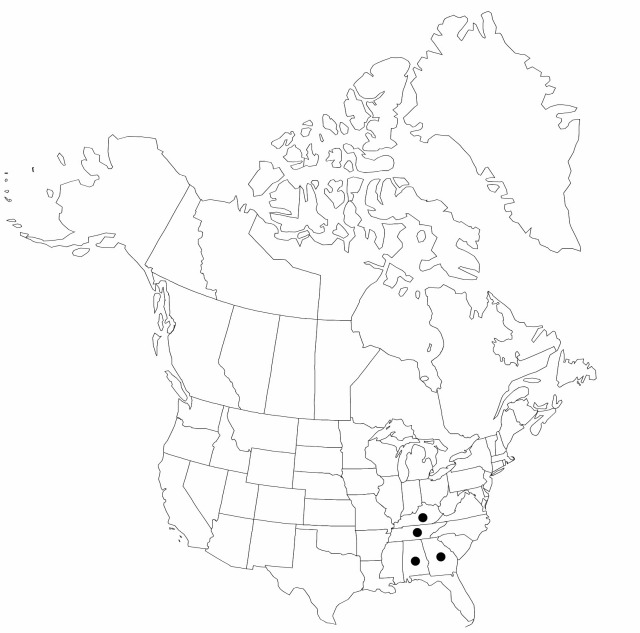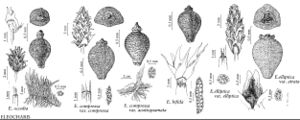Eleocharis bifida
Novon 11: 243, figs. 1F–J, 2. 2001.
Plants perennial, densely cespitose; rhizomes concealed by persistent culm bases, short, 4–5 mm thick, hard, cortex persistent, internodes crowded, scales decaying to coarse fibers, 1 cm, papery. Culms greatly compressed, 4–10 times wider than thick, often with 1 or 2 sharp ridges on 1 side, (8–)20–35 cm × 0.7–2.3 mm, hard, finely striate, spongy. Leaves: distal leaf sheaths persistent, not splitting, proximally red or stramineous, distally green to stramineous, inflated, papery, apex dark brown, broadly obtuse to subtruncate, callose, tooth absent. Spikelets ovoid, 4–9 × 2.5–4 mm, apex acute; proximal scale clasping 2/3–3/4 of culm, apex 2-fid; subproximal scale empty or with a flower; floral scales spreading in fruit, 30–60, 6–9 per mm of rachilla, medium or pale brown, midrib region often paler, ovate-lanceolate, 2.5–3.5 × 1.5 mm, apex 2-fid, carinate in distal part of spikelet. Flowers: perianth bristles 0(–5), stramineous to pale brown, 1/2 of to equaling achene length; stamens 3; anthers orange-brown, 0.7–1.5 mm; styles 3-fid. Achenes falling with scales, yellow-brown to medium brown, obovoid to obpyriform, nearly equilaterally trigonous, cross section circular to slightly compressed, angles obscure or evident, 0.9–1.1 × 0.6–0.75, neck usually very short, finely rugulose at 10–30X, 20 or more low, blunt horizontal ridges in vertical series. Tubercles brown, depressed-pyramidal, often rudimentary, 0.1–0.25 × 0.2–0.3 mm.
Phenology: Fruiting spring–summer (May–Jun).
Habitat: Seasonally wet places on limestone, cedar (juniper) glades, stream beds, prairies, ditches
Elevation: 200–300 m
Distribution

Ala., Ga., Ky., Tenn.
Discussion
Eleocharis bifida was previously included in E. compressa. A very few specimens of E. compressa var. compressa from the states where E. bifida is known are like E. bifida except for their entire proximal floral scales and evident rhizomes.
Selected References
None.
